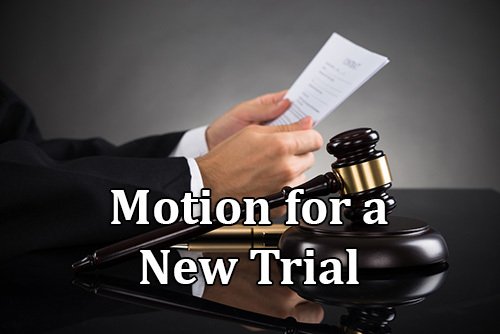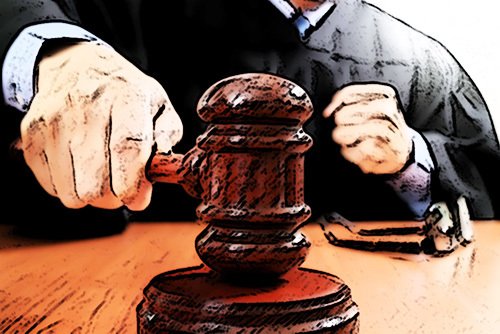In Texas, a motion for a new trial is a request by a convicted defendant that the court rehears the case. There are only a few grounds for a new trial. If the judge grants the motion, a new jury will be impaneled. Another trial date will be set. The new trial will rehear the part of the case being challenged.
Texas Rule of Appellate Procedure 21.1 states that a “new trial means the rehearing of a criminal action after the trial court has, on the defendant’s motion, set aside a finding or verdict of guilt.”

1. What happens of a motion for a new trial is granted?
If granted, a motion for a new trial would either:
- set aside a finding of guilt and rehear the entire case, or
- set aside the punishment and rehear the sentencing phase of the case.1
This would set the case back to where it was, before the earlier trial.
When the court sets aside the finding of guilt, a completely new trial will be scheduled. If it only sets aside the punishment, the case will resume from the guilty verdict.2
In either case, the outcome of the earlier trial cannot be alluded to in the new trial.3
2. Does there have to be a conviction?
Defendants in criminal cases can only request a new trial if they have been convicted.
A new trial can only be requested to set aside a finding of guilt.4 This can only be made by a judge or jury after a trial.5
The requisite finding of guilt is not made in cases that end with deferred adjudication. In these cases, the judge does not make a finding of guilt.6 Instead, the judge decides that the evidence “substantiates the defendant’s guilt.”7 The judge then delays the verdict while the defendant attempts to complete probation.
3. What is the deadline to file the motion?
A motion for a new trial has to be made within 30 days of the sentence.8
Any amendments to the motion have to be made within that 30-day window, as well, or have the leave of the court. Courts do not have jurisdiction to hear any filings made outside that window.9

4. What are the grounds for obtaining a new trial?
There are only a few recognized grounds for a new trial to be granted in Texas. These are:
- the defendant was not present or was denied a lawyer, unless the offense was a misdemeanor only punishable with a fine,
- the court made a material error that likely infringed the defendant’s rights, like misdirecting the judge on a point of law,
- the verdict was not decided by a fair expression of the jurors’ opinion,
- jury corruption, including the bribery of a juror,
- exculpatory evidence was intentionally destroyed to keep it from trial,
- a material defense witness was kept from court by force, threats, or fraud,
- a juror was so intoxicated during deliberation that their vote was influenced,
- the jury received new evidence after retiring to deliberate, or a juror talked with someone about the case,
- there was jury misconduct that kept the defendant from getting a fair and impartial trial, and
- the verdict was contrary to the law and the evidence presented.10
If any of these are present, the court must grant a motion for a new trial.
5. How is it different from an appeal?
A motion for a new trial is different from an appeal in several ways:
- the grounds for an appeal and a new trial are different,
- new evidence cannot be presented in an appeal, while they can in the new trial, and
- an appeal would not retry the case – it would only look for mistakes made by the trial court.
Defendants who get a new trial can still appeal its outcome.
If a defendant appeals the outcome of their case, it is possible that the appellate court demands a new trial take place.
6. What happens if it is denied?
If the motion is denied, the results of the earlier trial will stand. The verdict will remain the same. The defendant will have to serve the sentence imposed at the trial.
Defendants can appeal a denial of their motion for a new trial. However, appellate courts will rarely overturn the denial. They review the denial only for an abuse of the trial court judge’s discretion.11 This standard of proof is difficult to overcome.
Legal References:
- Texas Rules of Appellate Procedure 21.1.
- Texas Rules of Appellate Procedure 21.9(b)-(c).
- Texas Rules of Appellate Procedure 21.9(d).
- Texas Rules of Appellate Procedure 21.1.
- Donovan v. State, 68 S.W.3d 633 (Tex. Crim. App. 2002).
- Donovan v. State, Supra.
- Texas Code of Criminal Procedure 42.12(5).
- Texas Rules of Appellate Procedure 21.4(a).
- Texas Rules of Appellate Procedure 21.4(b) and State v. Moore, 225 S.W.3d 556 (Tex. Crim. App. 2007).
- Texas Rules of Appellate Procedure 21.3.
- Smith v. State, 286 S.W.3d 333 (Tex. Crim. App. 2009).
